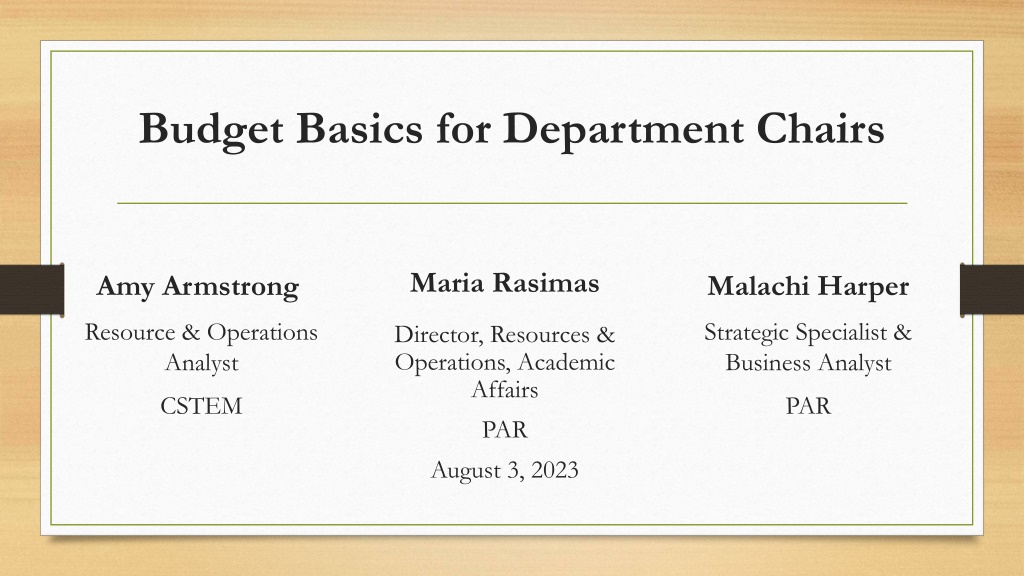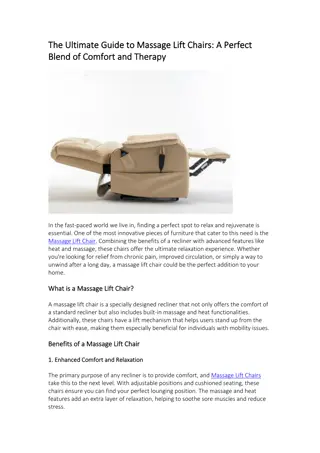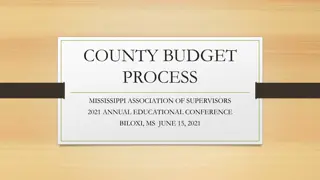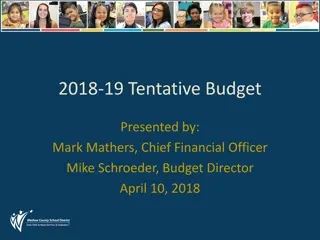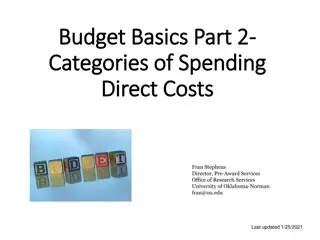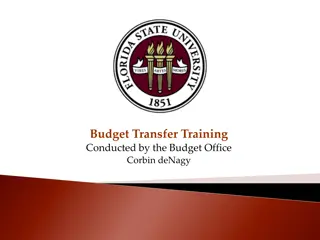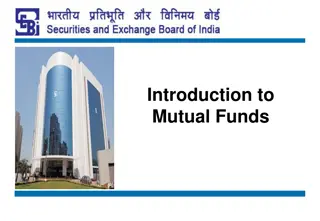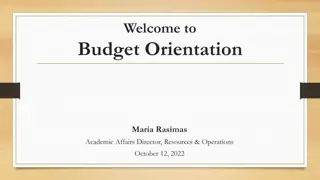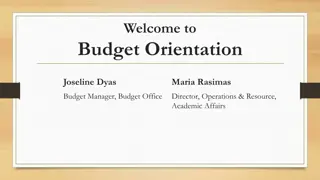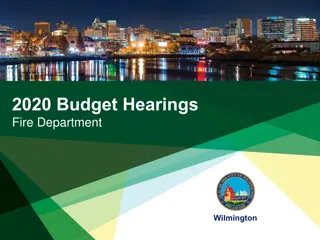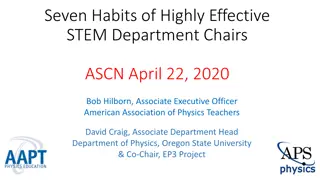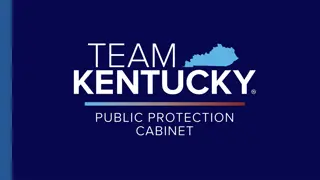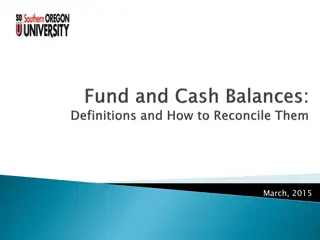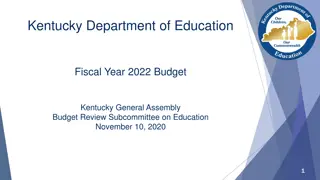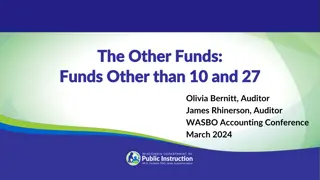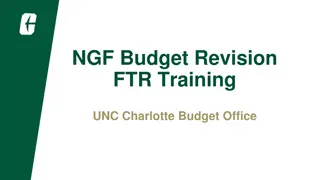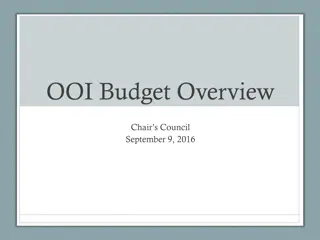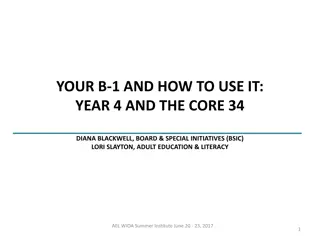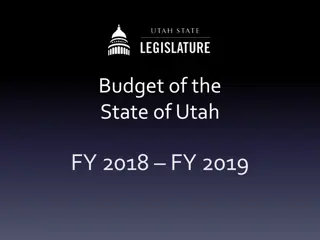Budget Basics for Department Chairs - Understanding Funds and Processes
This document provides essential information on budget basics for department chairs, covering topics such as types of funds (state and auxiliary), fiscal authority, budget reconciliation, procard and purchasing procedures, and timeline for budget processes. It outlines different funds like General Fund, Lottery Fund, Trust/Special Projects, and Auxiliary funds, detailing their sources, purposes, and allocation structures. The timeline for budget activities and annual processes for state funds are highlighted to guide department chairs in effective financial management.
Download Presentation

Please find below an Image/Link to download the presentation.
The content on the website is provided AS IS for your information and personal use only. It may not be sold, licensed, or shared on other websites without obtaining consent from the author. Download presentation by click this link. If you encounter any issues during the download, it is possible that the publisher has removed the file from their server.
E N D
Presentation Transcript
Budget Basics for Department Chairs Maria Rasimas Amy Armstrong Malachi Harper Resource & Operations Analyst Strategic Specialist & Business Analyst Director, Resources & Operations, Academic Affairs PAR August 3, 2023 CSTEM PAR
Agenda: Funds and Processes Types of funds (state, auxiliary) Your fiscal authority Timeline for Budget Uses of Funds: Procard and Purchasing Uses of Funds: Professional Development Monthly Budget Reconciliation Assigned Time and Reimbursed Time Support, Guidance and Resources
Types of Funds: STATE Sources, Fund Numbers, Purposes General or Operating Fund (485xx), the predominant fund for financing state operations; Lottery Fund (481xx), restricted by law to projects and programs directly related to the educational process; Trust/Special Projects (44xxx, 46xxx, 49xxx), state self-support funds, revenue generating activities such as campus newspaper, athletics, cultural programs, Extended Learning, etc. Student Fees in 485xx: Academic Excellence & Student Success Fee (AE&SS), Non-Discretionary or Course Fees, student fees reserved for specific purposes General Fund and Lottery originate in Sacramento trickle down to the CSU, campuses, Academic Affairs, colleges, departments. Non-Discretionary or Course Fees are generated on campus from fees paid by students, allocated to the colleges and then to the departments.
Types of Funds: AUXILIARY CSUSM Corporation (Fund 92xxx) Campus Programs - Internal Grants: Indirect Costs (IDC), Campus & Community Relations Funds (CCR), Grant Proposal Seed Money (GPSM) Sponsored Projects - External Grants: NIH, NSF Foundation (Fund 96xxx) Donations, Endowments
Timeline for Budget State and auxiliary funds should be reconciled every month. Fiscal year for state funds is July 1 June 30 and has specific annual processes: SUMMER/FALL (Phase I): July o Non-Discretionary Student/Course Fees submission forms due: Units with Student Course Fees only o Cash Trust submission forms due: Units with Cash Trusts (self support) only September o Budget Uploaded to all Units/Departments - make budget plan for the year, forecast through June 30
Timeline for Budget continued Spring (Phase II): January o March/April o Mid-year report due adjust budget plan as needed after December general ledger closes, forecast through June 30 March 31 goal to expense all funds as much as possible with some exceptions for travel, unplanned needs, etc. o April PCBO (Partners in Campus Business Operations) sends out end of year calendar deadlines to close the year. May o Carry Forward Request: If needed - Lottery through Budget Office, 48500 through Lead Analyst June o Fiscal Year Close: All Units - Follow Year-End Closing Calendar to monitor deadlines
Uses of Funds: PROCARD and Purchasing Prefer university purchasing processes (e.g. ProCard; Purchase Order) over personal reimbursement (Direct Pay) For staff with ProCards, you will review and sign ProCard Reconciliation Report confirming agreement of ProCard purchases monthly.**add note about ProCard training Best practices: o Code expenses to the correct account code o Confirm invoice is attached o Accurate description of purpose (e.g. recipient name for Professional Development) o Hospitality expense must have signedhospitality form attached
Uses of Funds: Professional Development Faculty should be expected to explain the following (however briefly) for spending requests: How will this purchase further your professional development? How does this purchase align with the College s mission and/or strategic goals? Guidelines: Any items purchased with University funds are intended for University business Any items purchased with professional development funds are the property of CSUSM Professional development funds must cover the entire cost of the item(s). Co-mingling of personal and any university state or auxiliary funds is not allowed (exception is travel) University Procurement processes must be followed, personal reimbursements must comply with the Direct Pay guidelines Technology purchases require approval from the Dean/Supervisor BEFORE purchasing and/or requesting from IITS PLEASE REVIEW PROFESSIONAL DEVELOPMENT WEBSITE FOR FULL GUIDELINES:
Monthly Budget Reconciliation Budget reconciliation is the process of reviewing transactions, supporting documentation, and resolving any discrepancies that are discovered after the Data Warehouse general ledger closes each month. Reconcile and Forecast monthly this is the foundation for internal control and ensures protection of the University s resources, and helps determine whether or not your funds will end the fiscal year on target . Professional Development/Faculty Funds should also be reconciled monthly by name and reviewed for accuracy Division of ACADEMIC AFFAIRS: Monthly reconciliation required by all budget staff and reviewed and signed by budget manager
18/19 Shadow Budget HISTORY PERIOD 8 Sample of monthly budget reconciliation reports TOTAL ROWS ON BOTH REPORTS MUST MATCH xxxx, Budget Analyst DATE xxxx, Department Chair DATE Values Proj/Pend Current Budget Projected Balance Available Current Budget Encumbrances Balance Available Proj/Pend Actuals Actuals Dept 1234 Fund Account # 44401 660003 SupSrv Other 660820 Other Hospitality 660859 Other Events 660903 Budget - PY Balance 0.00 0.00 0.00 977.83 321.95 1,327.34 0.00 2,627.12 6,160.18 54,324.00 0.00 0.00 0.00 0.00 0.00 0.00 0.00 0.00 0.00 0.00 0.00 0.00 0.00 0.00 0.00 0.00 0.00 0.00 (977.83) (321.95) (1,327.34) 3,590.81 963.69 (6,160.18) 27,162.00 21,000.00 (3,070.00) 0.00 0.00 0.00 0.00 0.00 0.00 0.00 0.00 0.00 0.00 0.00 0.00 0.00 (977.83) (321.95) (1,327.34) 3,590.81 963.69 (6,160.18) 0.00 9,000.00 (6,000.00) (2,248.00) 4,121.61 (1,161.14) (70.00) 3,907.00 697.08 (1,059.30) 1,027.07 1,990.76 3,590.81 3,590.81 Additional summary reports may be requested 44401 Total 48500 601100 Salaries Acad - Serialized 601300 Salaries Support Staff 601302 Salaries Special Consultants 601803 Salaries Acad Adjunct 606002 Travel Out of State 606801 Travel-In State Faculty 660003 SupSrv Other 660009 Professional Development 660820 Other Hospitality 660835 Other Rental/Lease Equipment 660859 Other Events 0.00 81,486.00 21,000.00 27,162.00 6,000.00 2,930.00 2,248.00 2,000.00 2,019.54 0.00 (6,000.00) 0.00 0.00 0.00 0.00 0.00 0.00 0.00 0.00 (6,000.00) (6,000.00) 0.00 0.00 3,070.00 0.00 3,056.39 791.60 70.00 0.00 1,102.92 470.80 69,045.89 71,673.01 0.00 9,178.00 1,650.00 0.00 3,907.00 2,200.00 0.00 6,121.61 858.40 (70.00) 3,907.00 1,097.08 (470.80) 50,375.11 51,338.80 0.00 0.00 400.00 588.50 119,421.00 123,011.81 43,348.04 43,348.04 48500 Total 1234 Total 18/19 DATA WAREHOUSE REPORT Business Unit = SMCMP - Cal State San Marcos, Fiscal Year = 2018, Period = 8 Dept Fdescr Fund Fdescr Acct Fdescr Current Budget Actuals Encumbrances Balance Available 1234 - Hstory 44401 - TF EL SpecialSessCampusP artner 660003 - SupSrv Other 977.83 0.00 (977.83) 660820 - Other Hospitality 321.95 0.00 (321.95) 660859 - Other Events 1,327.34 0.00 (1,327.34) 660903 - Budget - PY Balance 3,590.81 0.00 0.00 3,590.81 44401 - TF EL SpecialSessCampusPartner Total 3,590.81 2,627.12 6,160.18 0.00 0.00 963.69 (6,160.18) 48500 - TF Campus Operating Fund 601100 - Salaries Acad - Serialized 601300 - Salaries Support Staff 81,486.00 54,324.00 0.00 27,162.00 601302 - Salaries Special Consultants 21,000.00 0.00 0.00 21,000.00 601803 - Salaries Acad Adjunct Acad Yr 3,070.00 0.00 (3,070.00) 601814 - Salaries SupStf Shift Diff 0.00 0.00 0.00 606801 - Travel-In State Faculty 9,178.00 3,056.39 0.00 6,121.61 660003 - SupSrv Other 1,650.00 791.60 0.00 858.40 660009 - Professional Development 70.00 0.00 (70.00) 660820 - Other Hospitality 3,907.00 0.00 0.00 3,907.00 660835 - Other Rental/Lease Equipment 2,200.00 1,102.92 0.00 1,097.08 660859 - Other Events 470.80 0.00 (470.80) 48500 - TF Campus Operating Fund Total 119,421.00 123,011.81 69,045.89 71,673.01 0.00 0.00 50,375.11 51,338.80 1234 - History Total
Assigned Time and Reimbursed Time (Course Release, Grant Buyout) Provide an outline of every faculty member s expected non-course related work and funding sources as soon as possible for the academic year (during schedule build, if possible). Track all tenure track faculty work assigned to non-instruction E.g., faculty serving on Academic Senate, grant funded research buyout, etc. Must track so that college is reimbursed for the time faculty spent working elsewhere Share with College Budget Analyst for support with processing for timely reimbursement Due to the assigned time audit, a tracking process is being built for assigned time. More information will be released at the appropriate time.
Support, Guidance and Resources Your college s Dean, Associate Dean, and Lead College Analyst will be the best support for how a Chair is expected to manage the budget in your college. Your department Administrative Support Coordinator will be your partner in the administration of your budget. Annual Budget Orientation is provided by the Budget Office and Academic Affairs each fall for new and current budget managers and staff.
Working with your Dept ASC and Lead Analyst Peak budget planning = increased communication on forecasting expenses Frequent communication with your department ASC Shadow budget data can be used to create additional pivots The College's Lead Analysts and Associate Deans are the main touchstones for answering operational questions.
Planning and Resources (PAR) Website: https://www.csusm.edu/par/resource_operations/index.html Includes budget training & resources AA Approval Requirements MATRIX and Provost Signature guidelines Hospitality guideline link Travel guideline link Professional Development guideline link. PLEASE TAKE ADVANTAGE OF THESE HELPFUL RESOURCES
